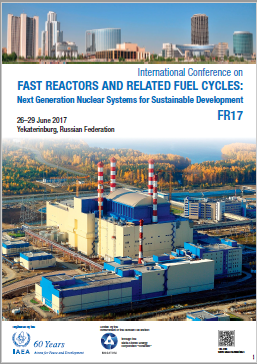Speaker
Dr
Michele Frignani
(Ansaldo Nucleare S.p.A.)
Description
In the European context, the implementation of the Generation-IV vision for safer, more sustainable, economic and proliferation resistant nuclear energy systems is being pursued as long-term action of the EU's strategies for a sustainable scenario securing energy availability. This action, envisaging innovative reactor concepts to implement the Gen-IV vision, is supported by the European Sustainable Nuclear Industrial Initiative: the Lead Fast Reactor is one of the concepts being pursued, and ALFRED – as its demonstration reactor – the cornerstone for its development.
Beyond this, the potentialities of the LFR, and the industrial interest that is continuously growing on this technology, have recently enlarged the scope of ALFRED. The evidences being collected in support to the claims of unparalleled safety and competitiveness of the LFR, opened the possibility for a shorter-term deployment, with lead-cooled Small Modular Fast Reactors as a promising option to address a market segment of increasing interest.
Accordingly, the efforts of the FALCON (Fostering ALFRED Construction) International Consortium are being oriented to fully exploit the potentialities of the LFR technology, extending the role of ALFRED also as a prototype of a lead-cooled SMFR, thereby addressing the objectives of industry both in the short- and long-term perspective.
To support such an ambitious mission, a pan-European effort is required at each layer composing the general picture of this programme: science and technics, industry, safety, management, financing, education and training and human resources. A first action in this sense is being pursued by setting up a Distributed Research Infrastructure, as a Centre of Excellence on the heavy liquid metal technology. The Infrastructure will gather the most relevant facilities already existing and planned, along with the new ones required to complement the present landscape for sustaining the realization of future LFRs. The vision for cooperation at a pan-European dimension will be achieved through the open access policy of the Infrastructure, that will permit students and senior experts to jointly program, design and perform experimental campaigns in the largest and most advanced technology park in the World.
The paper focuses on the phased Roadmap for the ALFRED Project implementation in its extended role, as well as on the vision for the Distributed Research Infrastructure, as an incubator for competences and ideas sustaining Europe in a leading position on the LFR technology. Finally, challenges and opportunities offered by this extended approach are outlined as a conclusion.
Country/Int. Organization
Italy
Primary author
Dr
Michele Frignani
(Ansaldo Nucleare S.p.A.)
Co-authors
Dr
Alessandro Alemberti
(Ansaldo Nucleare SpA)
Dr
Fosca Di Gabriele
(Centrum Výzkumu Řež s. r. o.)
Dr
Giacomo Grasso
(Italian National Agency for New Technology, Energy and Sustainable Economic Development (ENEA))
Mr
Ilie Turcu
(Institute for Nuclear Research, Pitesti (RATEN/ICN))
Dr
Mariano Tarantino
(Italian National Agency for New Technologies, Energy and Sustainable Economic Development (ENEA))
Dr
Marin Constantin
(Institute for Nuclear Research, Pitesti (RATEN/ICN))
Mr
Vincenzo Romanello
(Centrum Výzkumu Řež s. r. o.)

